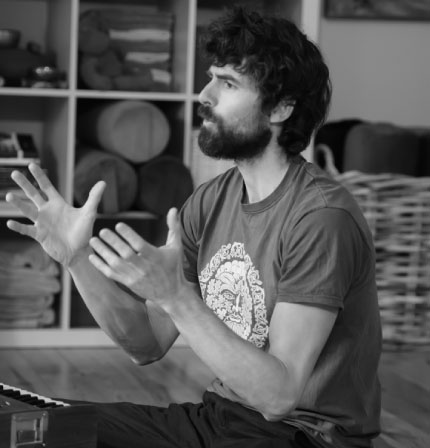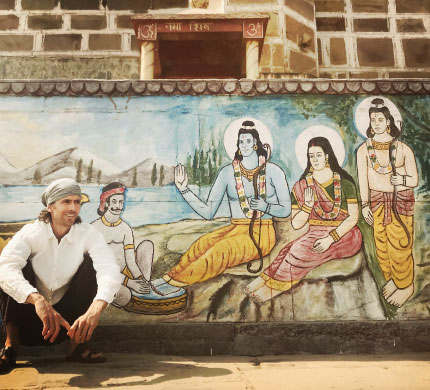
Living the Yoga Sūtra-s
Live Online Immersion
October 2023-May 2024
Thirty two-hour meetings October 2023 to May 2024
- Dive deep into the practical, foundational teachings of the time-proven, living yoga tradition.
- Develop a personal, living relationship with the robust, antifragile and adaptable principles of yoga.
- Deepen your connection to your undying self, and a self-identity that no one can touch, smear or take away.
Sometimes people say that they wish there was a user’s manual for a human incarnation… there is.
It is called the Yoga Sūtra: the text which encodes and distils the foundational teachings of the yogic vision in condensed teachings which we can work with to weave harmony into the fabric of our lives.
This is a miracle mirror text. Every time we look into it, we can gain new, fresh insights. First though, we have to meet the text. The Sūtra as a form defies translation into English, the Sanskṛt grammar allows an ultra-condensation that is not possible to replicate in translation.
On this course we will immerse ourselves in traditional study of the text. In other words, we will practice the text. We will explore it in the context of our day to day lives on a journey of ongoing self-empowerment and recovery.
This course will run October 2023 to June 2024, a kind of scholastic year, with 30 sessions.
Course timings:
Tuesdays 6-8pm UK, Saturdays 4-6pm UK, with recitation the half hour before (5:30-6:00 and 3:30-4:00)
October 2023 Tuesdays 17, 24, 31
November 2023 Tuesdays 7, 14, 21, 28 + Saturdays 11 & 25
December 2023 Saturday 2 and Tuesday 5
January 2024 Saturdays 13 & 27 Tuesdays 16, 23, 30
February 2024 Tuesdays 6, 13, 20, 27 + Saturdays 10 & 17
March 2024 Tuesdays 5, 12, 19, 26
April 2024 Tuesdays 9, 16, 23, 30
Additional recitation practice sessions and possible satsang/inquiry gatherings may also be scheduled depending on the interests and availability of the group.
This longer program will give us chance to develop a personal relationship with the text and dedicate enough time to understand many of the principles that underlie the teachings.
For example, the Yoga Sūtra assumes a familiarity with Sanskṛt grammar, logic and epistemology and a thorough working knowledge of the principles of Sāṅkhya. This course will ensure that we are exploring and applying the practical principles of the Yoga Sūtra in an authentic and empowering way. We will be exploring the teachings in traditional style: in relation to the whole of our lives.
Over the course of the eight months of exploration, we will explore chapters one and two in depth and detail, so we’ll be able to more readily apply the teachings in our day to day lives.
Those who would like to develop a recitation practice will be able to do this with more and more understanding of the text and the multiple layers of suggestive meaning encoded in the Sanskṛt.
We will gain an understanding of the whole text, looking at chapters three and four and situating Patañjali’s text in relation to different schools of Yoga and Tantra.
Participants will receive recordings of every session, extensive in-depth notes and study resources and have access to additional recitation and satsang sessions each term.
Sessions will involve presentation, discussion and sometimes inquiry exercises and meditation practices. We will take advantage of working as a group with occasional work in pairs and the opportunity to work together outside the sessions for those who would like to do this, for example by exploring themes of practice and inquiry with other course participants.
Basic Session structure:
- First half hour: optional recitation session
- Then, two hour session, always interactive but working from this foundation:
-
- 60-90 minutes: presentation,
- 30-60 minutes discussion, inquiry and meditation exercises.
-



Course fee: £1280
Early bird newsletter rate, sign up by 30 September: £1008
Email james@jamesboagyoga.com to sign up/register
your interest/find out more and hear as the schedule is confirmed.
Frequently Asked Questions
Is there a min/max group size?
Yes, the course needs a minimum of twenty participants to run. Forty-eight is the maximum group size, unless there are people who want to follow only on the recordings in which case the group could be larger.
If there are times when the group is split up to do some small group work, would that part be cut out of the recordings?
Whole group discussion will be recorded and available for everyone on the course to watch/listen/review.
Small group work will not generally be recorded and will not be included in the course recordings.
NB. There could be exceptions to this if in the course of our inquiry it emerges as appropriate. For example, if at a certain point we work in small groups to explore issues through a particular prism/yogic lens, we could record this and share it with the rest of the group to explore how the yogic prism can help us to explore in ways that reach beyond what we may be/have been accustomed to.
If we are not able to join live on the zoom and we have burning questions after watching a recording, could we possibly email them to you?
Definitely. There will either be a course group email or a forum on the web where these questions can be sent to the whole group.
Throughout the course, participants are encouraged to email me questions/reflections between sessions which we can then explore in subsequent sessions.
How will class recordings and course materials be available/accessible?
Upon enrolment, participants have access to the thinkific online course portal where all session recordings are uploaded after each session, along with additional reading and audio/video resources added during the course. All participants will have access to all learning materials and be able to download them for the duration of the course.
How would you accept payment from different countries?
Paypal and bank transfer are the ways I have used up to now.
The thinkific online course platform also processed payments, including the monthly instalments option.
I appreciate the depth of learning and commitment behind offering such a course and think the fee is very reasonable, but it will be difficult for me to pay all at once, are payment plans available?
I am more familiar with Buddhist practices and teachings from the Pali canon, I am not sure if you are familiar with these, but if so, is the basic yoga philosophy similar, or very different? I believe some of the same words may be used in both Yoga and Theraveda Buddhism, but again, I know very little overall about this topic. Would this course help me gain a deeper understanding of broader Indic philosophy and its practice?
For sure! There is much common ground between yoga philosophy and Buddhist perspectives as well as some distinctions. We will be exploring the Yogic perspective in depth and this will to some degree help us understand some of the relationship between yoga and other perspectives: Buddhist, Vedānta etc. and we will look at how the foundational yoga sūtra relates to Tantric schools, which also overlaps with some Buddhist schools.
I think this course of inquiry would be highly complementary and useful for any student of Indic perspectives, practical philosophy, who is interested in deepening a pragmatic and stoic support structure for life, who is keen to empower themselves to be able to navigate these times of mis/dis/information overload from a sounder centre with subtler and surer access to practical tools to ally discernment and intuition and robust means of analysis.
Do you think we would walk away from this course with a better understanding of Sanskrit and translations?
100%. If you come to the sessions and read the materials, this is pretty much guaranteed. You will also receive fairly thorough notes on terminology. By the end of this course it is realistic that you will be able to relate to at least several key sūtra-s in the original Sanskṛt as we’ll have become well familiar with the reach and practical import of key Sanskṛt terms that defy translation. Through the course, you’ll be able to develop and deepen your own evolving understanding of the sūtra-s and the principles they encode so that consulting published translations can be useful rather than confining.
I also wonder if I would be able to translate better some of the Pali words I hear, or would I perhaps get confused if sometimes the Pali/Sanskrit had slightly different meanings. Any thoughts on that?
You mentioned that we will take time to establish a familiarity with Sanskṛt grammar, logic and epistemology and principles of Sāṅkhya philosophy. This sounds a lot, will this not be overwhelming?
No, the capacity to translate these in-depth teachings in ways that are practical and relatable is what I have been practising and training for the last twenty years and what some of my Sanskṛt teachers blessed and enjoined me to dedicate my ongoing study and teaching to.
I did not have a ‘classical education’, did not learn Latin/Greek/rhetoric at school, but went to a local comprehensive state school where I was fortunate to have some real teachers and learn some things about learning. I have been fortunate to live in different languages and cultures and continue a lifelong apprenticeship in learning, communication, languages, literature and textual analysis.
Communicating between and across cultures is one of the things that I am most trained in. I am confident that anyone who follows this course will gain clearer access to and understanding of the Sanskṛt of the yoga sūtra, so you can work with the text and continue to consult it through your life, that you will refine your understanding of how you relate to, parse, analyse and digest information from diverse sources and that the Sāṅkhya model of existence that yoga assumes a familiarity with, and which is in some ways so distinct from popular ‘Western’ world views, will become a familiar and practical reference for you.
